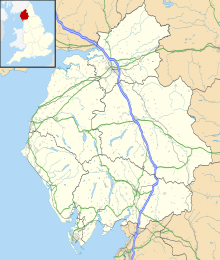Gowbarrow Park
| Site of Special Scientific Interest | |
| Location | Cumbria |
|---|---|
| Grid reference | NY415208 |
| Coordinates | 54°34′30″N 2°54′36″W / 54.575°N 2.910°W |
| Area | 133.4 acres (53.99 ha) |
| Notification | 1986 |
Gowbarrow Park is a Site of Special Scientific Interest (SSSI)[1][2] in Lake District National Park in Cumbria, England. It is located on the lower slopes of Gowbarrow Fell and borders Ullswater lake. It is 2 km from the hamlet of Dockray. This protected area has an outstanding diversity of lichen species. Red squirrels have been recorded in this protected area.
Biology
[edit]Tree species in Gowbarrow Park include wych-elm and alder, some of which has been coppiced. The shrub spindle is present here at the northern limit of its range in England. Herb species include brooklime, birds-eye primrose and grass-of-parnassus.[1]
A total of 126 lichen species have been recorded from Gowbarrow Park. Lichens in the wych-elm woodland include Bacidia rubella, Lobaria pulmonaria, Lobaria laetevirens and Lobaria amplissima. The lichens Lithographa dendrographa and Rinodina isioides are also found in this protected area.[1]
Bird species in this protected area include buzzard, sparrowhawk, pied flycatcher, ring ouzel, redstart, wood warbler and willow warbler.[1]
Geology
[edit]Outcrops in Gowbarrow Park are from the Borrowdale Volcanic Series and the rocks vary from strongly acidic to calcareous.[1]
Land ownership
[edit]All of the land within Gowbarrow Park SSSI is owned by the National Trust.[3]
References
[edit]- ^ a b c d e "SSSI detail". designatedsites.naturalengland.org.uk. Retrieved 15 December 2024.
- ^ "Protected Planet | Gowbarrow Park". Protected Planet. Retrieved 15 December 2024.
- ^ "Mapping the habitats of England's ten largest institutional landowners". Who owns England?. 6 October 2020. Archived from the original on 7 October 2024. Retrieved 15 December 2024.

